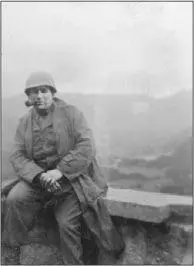For my night in Obersalzberg, I checked in close to the Eagle’s Nest at the Hochlenzer hotel. It was an older place, perched on the side of a hill, at forty-five euros probably the cheapest around. I could see why. While perfectly well maintained, the hotel had an eerie timelessness about it, as if nothing had changed since 1938, the year the watercolor landscapes hanging above my bed were painted. In the lobby, one photo stood out among many. Its frame bolted to the wall with heavy screws (other prints had been stolen), the picture, labeled “A. Hitler an Hochlenzer,” showed a smiling Führer looking jaunty in a double-breasted suit and fedora as he shook hands with a number of people on the patio of the hotel.
One person in the photo, a man in a corduroy jacket and lederhosen, looked familiar. He was blond and tall like the man standing beside me in the dining room of the Hochlenzer right now. “This hotel has been in the family for many, many years,” the man said, slapping down a plate of cold cuts before me, unhappy that my late arrival had required him to reopen the kitchen.
As I ate the lonely slices of Jagdwurst in the empty knotty-pine dining room, the light suspended above the table caught my eye. The lampshade, perhaps a foot high and sixteen inches across and made of a thick brown paper, was of little interest. The trim, however, the pink and gold embroidery stitching, rang a bell. It wasn’t identical to the pattern on the New Orleans lampshade, but it was close. Very close. Not that this was a great surprise. If the accoutrements of a human skin lampshade couldn’t be found here, in these mountains, where would they be? I was in the zone.

David Jacobson on Hitler’s balcony, 1945
• • •
I had one more address. It was for David Duke, Louisiana’s most famous fascist. If you happen to be in possession of a lampshade possibly made in a German concentration camp that turned up in a flooded building in New Orleans after the storm of the century and you want to find someone who best personifies the psychic connection between those two points, David Duke is your man.
Over the past several years, outside of occasional sightings in the deli department of the Mandeville Winn-Dixie, Duke had all but disappeared from the shores of Lake Pontchartrain. Now I was told he was residing, deliberately under the radar, a mere hour’s drive from the Eagle’s Nest. This was a switch, a Nazi hiding in plain sight amid the dampfnudeln bakeries and T-shirt shops of an Alpine tourist town rather than down a Buenos Aires back alley or deep within the Brazilian jungle.
Back to the days of Napoleon, who sold half a continent to finance a doomed attempt to conquer the world, the snake oil—drenched world of Louisiana political theater has had its outsized players, megalomaniacs of every stripe. There was Henry C. Warmoth, a Reconstruction Republican who was elected governor in 1868 at age twenty-six by a grand total of two votes and then proceeded to run the state debt from $6 million to nearly $100 million in a few short years. More recent times have included segregationist kingpins like Judge Leander Perez Sr., unchallenged ruler of the Plaquemines and St. Bernard swamplands, who in 1960 unleashed a call to action against the integration of New Orleans schools: “Don’t wait for your daughter to be raped by these Congolese. Don’t wait until the burr heads are forced into your schools. Do something about it now.” Then, of course, there was the Long trinity: Russell Billiu Long, who served thirty-nine years in the U.S. Senate, and his uncle Earl Kemp Long, the three-time governor and self-proclaimed “last of the red-hot poppas,” who was quoted by his occasional Boswell, A. J. Liebling, as saying he wasn’t against nobody “for reasons of race, creed, or any ism he might believe in except nuttism, skingameism or communism.” And sitting at the top of it all, Earl’s brother, the Kingfish—Huey Pierce Long, who, it is often conjectured, dreamed of overthrowing Franklin Roosevelt’s U.S. government and making himself a latter-day Napoleon of a self-styled share-the-wealth, Libertarian, downhome National Socialist state, albeit with much better food, music, and manners.
David Duke, loner son of a largely absent Shell Oil executive father and an alcoholic mother, entered this ripe tapestry as a full-blown race fascist in 1967 when, at age seventeen, having carried a copy of Mein Kampf to classes at John F. Kennedy High School in New Orleans’s Lakeview section, he first appeared in public wearing a Ku Klux Klan hood. By his early twenties, Duke, the self-anointed Grand Wizard of his own Knights of the Ku Klux Klan (the KKKK), was hosting LSU campus birthday parties for Adolf Hitler while wearing a knockoff Hugo Boss SS uniform.
Duke soon smoothed these rough edges and positioned himself as a kinder, gentler, Ayn Rand—reading racialist for the post—civil rights era. Rather than one more troglodyte blocking the school door like George Wallace, here was a soft-spoken young man tricked out as a network anchor type (rumors of early-career plastic surgery earned Duke the nickname “the nose job Nazi”), a dreamboat of a National Socialist to appeal to doublewide-dwelling Frauenschaft . After a bizarre interlude during which he wrote a sex manual for women, Finders-Keepers, under the pen name Dorothy Vanderbilt, Duke ran for public office in the late 1980s, with surprising success. In 1989, campaigning as a Republican in a Metairie district adjacent to New Orleans, he was elected to the Louisiana state legislature. A year later, in a U.S. Senate primary, Duke received a shocking 44 percent of the vote, just missing a runoff with the stalwart seventeen-year incumbent, J. Bennett Johnston.
This set up one of the most phantasmagorical elections in state history, the 1991 gubernatorial “race from Hell” pitting Duke, who had astonishingly vanquished the sitting governor, Buddy Roemer, in the primary, against the coolest cucumber of all Louisiana pols, the wily, unashamedly graft-ridden three-time chief executive Edwin Edwards. Edwards’s presence in the race was something of a surprise. By the late eighties, after he was implicated in a far-reaching series of scandals involving such disparate individuals as Carlos Marcello, the New Orleans mob boss often mentioned as a possible plotter in the John Kennedy assassination, and Tongsun Park, a South Korean rice magnate accused of bribing a wide range of U.S. officials, Edwards’s political career appeared finished. According to the Shreveport Journal, the only way the former governor could get elected again would be “to run against Adolf Hitler.” In David Duke, he had the next best thing.
Matched with a canny cracker-barrelist like Edwards, Duke, never your Triumph of the Will spellbinder, came off like a cue card—reading ideologue, more Volk than folk. The election was basically over when the famous slogan “Vote for the Crook—It’s Important” began to appear on bumpers throughout the state. Zingers from Edwards, a noted philanderer—stuff like “The only thing David Duke and I have in common is we’re both wizards under the sheets”—only ran up the score. Edwards, unsurprisingly, went on to preside over an administration racked with impropriety and would eventually be jailed for racketeering. Still, Duke received 671,000 votes, including 55 percent of whites, leading the undeterred candidate to declare, “I carried my constituency.”
Duke’s electoral career peaked with the Edwards defeat. By the 1996 Senate primary he was under 12 percent and sinking fast. His regular-Christian-guy pose was blown with the 1998 publication of his seven-hundred-page autobiography, My Awakening: A Path to Racial Understanding, in which Duke contends, among many other things, that more than 25 percent of all African Americans have “an IQ of under 75” and that the Jewish-controlled media is covering up the existence of the “Aryan gene.” Under investigation for fraud and tax evasion, he pled guilty in December 2002 to embezzling several hundred thousand dollars in donations from supporters and gambling it away in Gulf Coast casinos. He was sentenced to fifteen months in the federal lockup in Big Spring, Texas, a minimum-security prison that didn’t even have an Aryan Brotherhood, which was probably just as well from Duke’s point of view. After his release in 2005, having alienated most of his better-heeled followers, Duke relocated to eastern Europe, where, he said, he felt “more in tune with the demographic.”
Читать дальше













